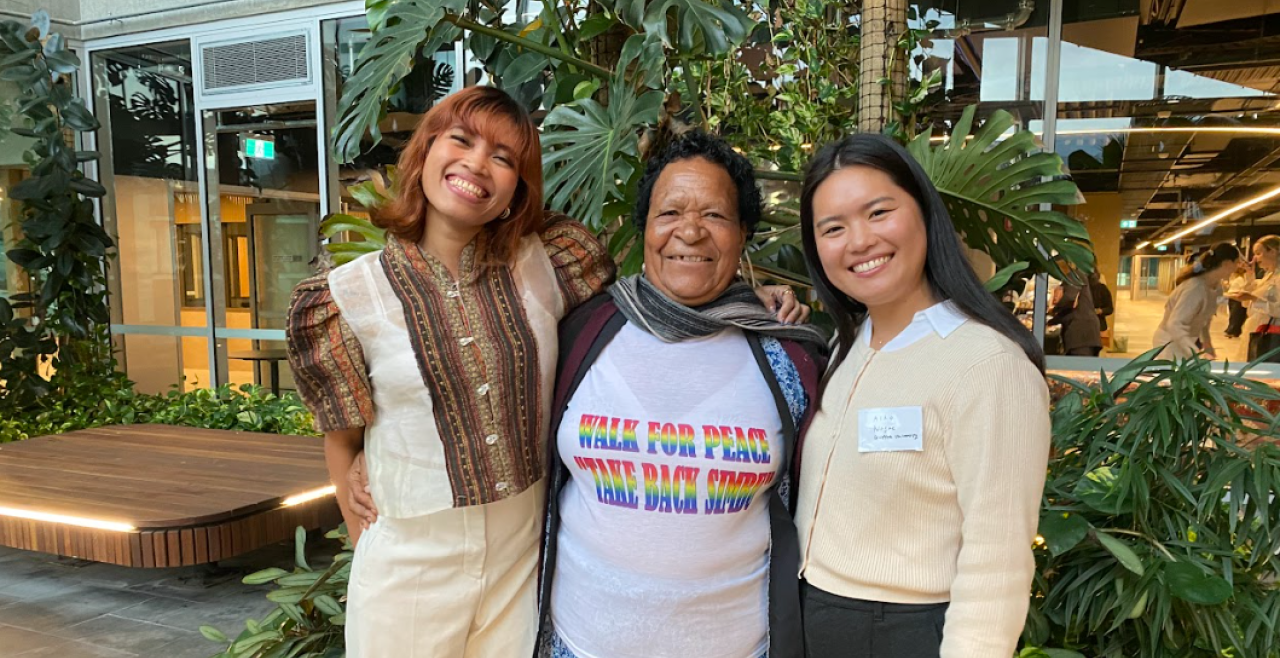Care in fragile contexts: the lifesaving role of civil society organizations

MELBOURNE, Australia - On Tuesday, Spotlight Initiative and the Women’s Peace and Humanitarian Fund (WPHF) participated in a panel discussion exploring the role of civil society organizations (CSOs) in advocating for access to gender-based violence (GBV) and conflict-related sexual violence (CRSV) services.
The session was part of a two-day conference, ‘Justice Denied: Fighting Widespread Impunity for Conflict-Related Sexual Violence (CRSV)’, which was hosted by The Australian Research Council Centre of Excellence for the Elimination of Violence Against Women (CEVAW) and the Australian Institute of International Affairs, Victoria.
‘Care in fragile contexts: the lifesaving role of civil society organizations in delivering survivor-centered services in conflict-affected settings’ highlighted the need for inclusive and accessible support systems for gender-based violence survivors. Speakers included:
- Programme Coordinator for the Women Human Rights Defenders Window at Women's Peace & Humanitarian Fund (WPHF), Margaret Muthama (virtual participant);
- Director of Kup Women for Peace, Angela Apa
- Human Rights Defender and Spotlight Initiative Global Civil Society Reference Group Member Shamah Bulangis
- Postgraduate student in Global Public Health at Griffith University, Aiko Nagae.
The session was moderated by CEVAW PhD candidate at Monash University, Priya Dhanani.
"Our main purpose is to support women in responding to crises and building peace on the frontline" - Margaret Muthama, WPHF
“Our main purpose is to support women in responding to crises, and building peace on the frontline through providing learning opportunities to civil society organizations and women human rights defenders,” said Programme Coordinator for the Women Human Rights Defenders Window at Women's Peace & Humanitarian Fund Margaret Muthama. Ms. Muthama said that this included addressing early and forced marriage, trafficking, sexual and gender-based violence (GBV) and conflict-related sexual violence (CRSV). Through support for civil society organizations globally, she shared that WPHF had increased access to survivor-centred services such as healthcare, psychosocial care and legal services, including access to sexual and reproductive health and rights, for more than 32,000 women and adolescents.
Angela Apa, Director of Kup Women for Peace, a Papua New Guinean civil society organization supported by Spotlight Initiative and WPHF, spoke on the critical role of women and girls in peacebuilding.
"We shouldn’t be watching our mothers and sisters being forced to marry men with guns, being raped, our houses being destroyed." - Angela Apa, Kup Women for Peace
Following more than three decades of tribal conflict, Ms. Apa brought together women and girls from rival tribes to negotiate an end to the violence. “We said, ‘We shouldn’t be here watching our mothers and sisters being forced to marry men with guns, being raped, our houses being destroyed’… I thought that we should do something. We started a women’s organization called Kup Women for Peace.”
After collectively bringing an end to the conflict, Ms. Apa and her colleagues turned their attention to supporting women and girl survivors of violence, including sorcery-accusation related violence (SARV).
“We have trained human rights defenders in each of our six districts. They are human rights defenders on the ground who are our focal people reporting to us what’s happening. If a woman is accused of sorcery, or raped or beaten, they call us, we call the police and the police have a rapid response team. We also have GBV action committees in the district,” she said.
Human Rights Defender and Spotlight Initiative Global Civil Society Reference Group Member Shamah Bulangis explained how civil society leadership was a critical tool for ensuring Spotlight Initiative programmes meet the needs of the women and girls they serve.
“Spotlight Initiative has invested $195 million in civil society organizations." - Shamah Bulangis, Spotlight Initiative Global Civil Society Reference Group
“Spotlight Initiative has invested $195 million in CSOs and 5,000 local women’s rights organizations have reported greater influence and agency because we have advocated for civil society to be part of the governance structure at global, regional and national level,” said Ms. Bulangis. She added that the Civil Society Global Reference Group had pushed for flexible funding to CSOs during Covid and created Co-Design Principles to guide engagement with civil society in the Initiative’s second phase.
Postgraduate student in Global Public Health, Aiko Nagae, shared findings from her study examining the intersectional factors of female genital mutilation and cutting (FGM/C) in South-East Asia and how to identify and engage groups at risk. These included socioeconomic factors such as “marriageability”. “If a girl was not circumcised, the whole family can face social stigma,” said Ms. Nagae. “For example, if you sell water in the community, people won’t buy water from you if you have uncut girls in your family.”
The lessons and key takeaways from each session have been recorded to inform a joint statement on reducing CRSV and ending impunity.
